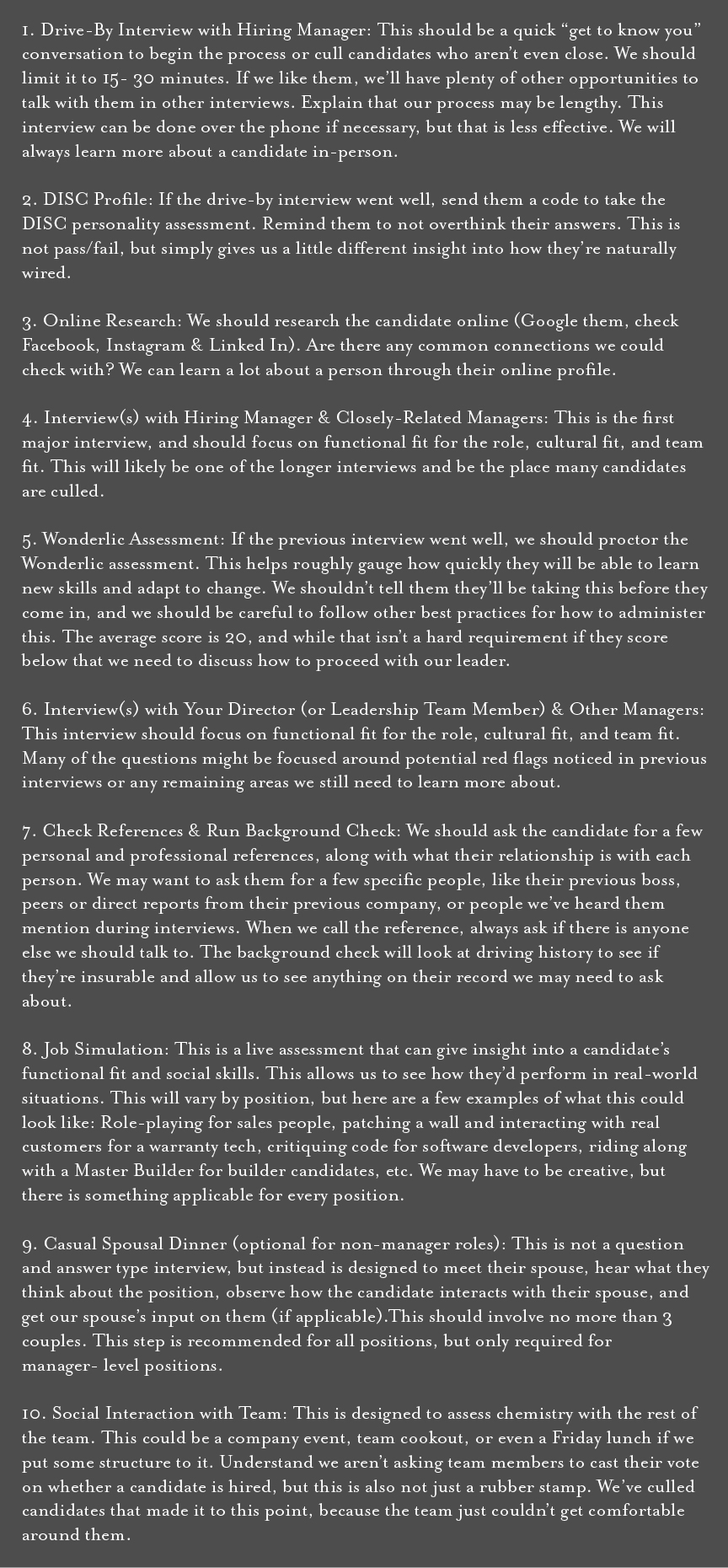
A Kingdom View of Hiring
This article is found in the Betenbough Companies Leader’s Guide.
We have a selection process, not a hiring process. It starts with the hiring manager asking God to hand-select the person He wants to join our team in the work He’s given us. Sometimes God may send a Christian and sometimes He may want a non-believer to join us. Our sacred responsibility is simply to be obedient to wait for the person He leads us to. Ultimately, selecting who is on the team is one of the most important decisions a leader will ever make.
Often times when we need another person on our team, we may already be overwhelmed trying to get everything done. Jack Welch explains that “Sheer convenience or a candidate’s likeability may make you want to squint on this front. You just can’t without doing a disservice to your organization.” It may be tempting to hire the first person we talk to who seems interested. In our rush to get some help we are extremely naïve and actually think after one or two quick interviews that we found someone who will love and care for our business alongside us. But often very quickly after they enter our life, we find they don’t care as much as we do, or work as hard as we do, and hey, they don’t even show up on time! If we keep this up, we will have a company full of employees. Remember the definition of an employee? An employee is someone who comes late, leaves early, and steals while they are there. We don’t want employees, we want team members, and the process to find and hand-select those will require more time and energy. Hiring may seem like just another decision in your packed schedule, but it isn’t just one decision. You’re picking someone who will make hundreds of decisions on your behalf.
The selection process will typically take 30 days (from application to job offer), but time is not the key factor! How long it takes is a function of the leader’s prioritization. This process has been successfully completed in as little as 3 weeks. We should make the selection process a top priority and work with our leader to ensure the necessary day-to-day operations are choreographed around this important process.
Over time we’ve found that following these steps helps the hiring manager get to know the candidate as a whole person. Through the process we’ll uncover things that either lead us toward or away from hiring them. This decision is too important to make in isolation, so we invite others into the process. Deciding who to hire is not a democratic process, but remember that “without counsel plans fail, but with many advisers they succeed.” As we invite others to speak into the decision we’re responsible for making, we have the opportunity to see things from different points of view and develop unity around a candidate.
Along the way, we’ll uncover things that either lead us toward or away from selecting them. We must continually ask God to give us clarity on whether a candidate should move forward or not, and what the next right action should be.

The order of these steps is important, and should be followed unless there are special circumstances that require us to do steps out of order. Every step is required for every position in our organization, unless it is explicitly marked as optional. If you don’t have peace to move to the next step, but also don’t feel like you should eliminate someone from the process, feel free to add additional interviews to do further investigation. Ultimately if there isn’t “fireworks” going off in your head because you are so excited to get this person on your team, don’t move on to the next step.

This selection process is based upon practical experience including a ton of mistakes and great wisdom from other business leaders, including Dave Ramsey. Dave uses 12 components in his process with the goal of finding out someone is not a good fit for his organization before ever hiring them, dramatically reducing turnover. As we have adopted a more intentional selection process, we also have seen a significant reduction in turnover resulting in more engaged and healthy teams.
Ultimately, if you don’t have 100% peace with a decision, don’t do it! It would be better to extend the selection process, than take a chance on someone who could damage the team, only to find ourselves starting over again. One way to check ourselves on this is by asking if we’d be devastated if they don’t accept the position. If not, we should not offer the position to them.

Great leaders are always in recruiting mode. We should take notice when a manager at a tire store, or a hostess at the dentist office wows us somehow. We may not be recruiting them to a specific role, but we should tell them we noticed how great of a job they’re doing, and we’re always looking for great people like them. Simply mention that if they’re ever thinking about making a change, they should look us up. The rest is up to them! A few of our best people have come through quick interactions like that. Simply encouraging someone by telling them you recognize the great job they’re doing will bless that person, even if they never apply.
For more information, check out these related posts by clicking on the pictures below. Also, click HERE for more information on our Kingdom At Work Coaching efforts!


